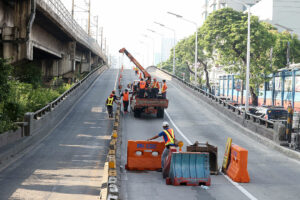THE GOVERNMENT must promote genuine competition among private-sector partners embarking on flagship infrastructure projects, going beyond its recent order to simplify the permit process for proponents of such projects, an economist said.
“EO 59 should include not just the implementation of these projects but also the rules governing the selection of private partners to promote more competition and local participation,” according to Leonardo A. Lanzona, who teaches economics at the Ateneo De Manila.
He was referring to Executive Order (EO) 59, issued last week, which streamlined the approval process for flagship infrastructure projects by bringing permit applications more in line with the norms set by the Ease of Doing Business law. The law deems complete permit applications to be approved if not acted upon within a prescribed period.
“The (priorities implied) by the EO can affect the criteria for evaluation or set preferences for certain private groups that may contradict the interests of society, including environmental and social safeguards,” Mr. Lanzona added.
“The government should strategize properly in order to obtain the true value of these projects to society,” he said.
The EO cut down the national or local permit requirements for flagship projects to the environmental compliance certificate or certificate of non-coverage from the Department of Environment and Natural Resources; building or occupancy permits issued by a municipal official; excavation permits from the local government unit, and clearances from the National Commission for Culture and Arts, Metropolitan Manila Development Authority, Department of Public Works and Highways, and the Bases Conversion and Development Authority, where applicable.
It also cited the need to comply with “other requirements as mandated by the Constitution and existing laws.”
Terry L. Ridon, a public investment analyst and convenor of think tank InfraWatch PH, said right-of-way issues should also be a priority to avoid major delays in infrastructure projects.
“Right of way is a perennial bottleneck for (infrastructure flagship projects), as it is difficult for government to immediately build resettlement communities for affected informal settler families,” Mr. Ridon said in a Viber message.
Last month, Mr. Marcos issued a separate EO to fast-track the implementation of national railway projects, which are also been hampered by right-of-way issues.
EO 59 is expected to reduce transaction costs when implementing infrastructure projects, University of Asia and the Pacific Senior Economist Cid L. Terosa said in an e-mail.
“It complements the development of ‘hard infrastructure’ with ‘soft infrastructure’ in the form of streamlined processes and procedures. EO 59 therefore has the potential to raise both efficiency and productivity of infrastructure project implementation,” he said.
Upon issuance of the EO, the government must incorporate feedback from communities, businesses and other stakeholders affected by the infrastructure projects, Mr. Lanzona said.
There are currently 185 infrastructure projects in the pipeline, valued at P9.4 trillion.
The government’s Build Better More program includes 197 projects including mass transit, railways, roads and bridges, airports, and seaports.
The government’s infrastructure program for this year is budgeted for P1.472 trillion, equivalent to 5.6% of gross domestic product, the Development Budget Coordination Committee said.
For 2025, the infrastructure program will spend P1.66 trillion, or about 5.7% of GDP. — Beatriz Marie D. Cruz
